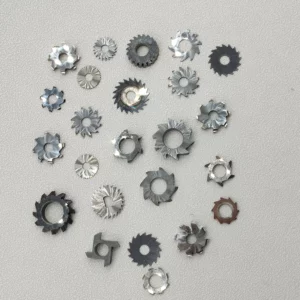Table of Contents
ToggleCarbide Saw Blades
When it comes to cutting steel, few tools can match the efficiency and durability of carbide saw blades for steel. These blades have gained immense popularity due to their ability to handle tough materials, making them a go-to choice for both professionals and DIY enthusiasts. This article delves into the essentials of carbide saw blades, their benefits, applications, and key points to consider while purchasing them.
Understanding Carbide Saw Blades
Carbide saw blades are engineered to be robust and long-lasting, thanks to their unique construction. Unlike traditional steel blades, carbide blades feature a cutting edge made from tungsten carbide, which is one of the hardest materials available. This toughness allows them to cut through steel with precision and speed.
Imagine a workshop where a craftsman is tasked with cutting through thick steel rods. By using a carbide saw blade, the craftsman not only enjoys smoother cuts but also reduces the frequency of blade replacements — a significant cost-saving factor. For those who often work with steel in construction, manufacturing, or automotive applications, investing in carbide saw blades is a decision that keeps on giving.
Benefits of Carbide Saw Blades for Steel
When customers consider purchasing carbide saw blades for steel, several benefits come to mind:
1. Longevity and Durability
One of the standout features of carbide saw blades is their impressive lifespan. These blades can outlast high-speed steel (HSS) or carbon steel blades significantly. This durability means less downtime for blade changes, which is crucial in any manufacturing or construction environment.
For example, a metal fabrication company that regularly cuts steel sheets can expect to save both time and money by opting for carbide saw blades. Instead of frequently stopping work to replace worn-out blades, the company can maintain productivity levels.
2. Precision Cutting
Carbide saw blades offer precision cutting capabilities that are essential when working with steel. The sharpness of the cutting edge combined with the refined design allows for cleaner and more accurate cuts, which is critical for projects requiring tight tolerances.
Consider a scenario where customized steel components are needed for machine assembly. Using carbide saw blades ensures that the cuts match the exact specifications, resulting in following processes being smoother and more efficient.
3. Resistance to Heat and Wear
Carbide is known for its ability to withstand high temperatures generated during cutting. This characteristic is essential in steel cutting applications, as overheating can lead to blade damage and compromised cutting quality. Carbide saw blades resist wear effectively, maintaining their cutting efficiency over prolonged use.
In practical settings, a contractor who regularly uses saws for cutting steel beams will find that carbide blades withstand heat and maintain their sharpness longer than other options. This resilience translates into fewer interruptions during work.
Applications of Carbide Saw Blades for Steel
Carbide saw blades for steel can be utilized across various industries and applications. Here are a few notable examples:
1. Metal Fabrication
In metal fabrication shops where accuracy is critical, carbide saw blades are frequently fitted to cutting machines. Whether fabricating parts for machinery or preparing materials for construction, these blades ensure clean cuts and optimum performance.
2. Construction
Contractors in the construction industry often rely on carbide saw blades for precision cutting of steel reinforcement bars and structural steel. The speed and efficiency of these blades make them ideal for projects that demand quick turnaround times without compromising quality.
3. Automotive Industry
In the automotive sector, the precision and durability of carbide saw blades are invaluable for cutting various steel components, from chassis elements to engine parts. Ensuring that cuts are exact translates into better-fitting parts and improved overall performance.
Key Considerations for Purchasing Carbide Saw Blades for Steel
When it comes time to choose carbide saw blades for steel, customers should keep several factors in mind to ensure that they make the best possible decision:
1. Blade Design and Teeth Count
Different applications require different designs. For instance, blades with a higher tooth count may be suited for finer cuts, while blades with fewer teeth are better for faster, rougher cuts. Understanding the specific needs of the project will guide the selection process.
2. Size and Compatibility
It’s essential to choose a blade that fits the saw being used. Carbide saw blades come in various diameters, so knowing the specifications of your saw is crucial for achieving optimal performance.
3. Quality and Brand Reputation
Investing in high-quality blades from reputable manufacturers is advisable. A well-reviewed product not only guarantees reliability but also often includes warranties that can further protect your investment.
Conclusion
In summary, carbide saw blades for steel are a game changer for anyone in need of reliable, efficient, and precise cutting solutions. Their longevity, heat resistance, and suitability for various applications underline their importance in industries such as metal fabrication, construction, and automotive.
As you consider incorporating carbide saw blades into your toolset, remember to weigh the benefits against your specific needs, including the type of cuts required and your budget. Choosing the right carbide saw blades for steel can lead to enhanced productivity and superior quality in your projects, ultimately solidifying their place in the toolkit of any adept craftsman. Investing in these blades is investing in efficiency, accuracy, and the longevity of your tools.
